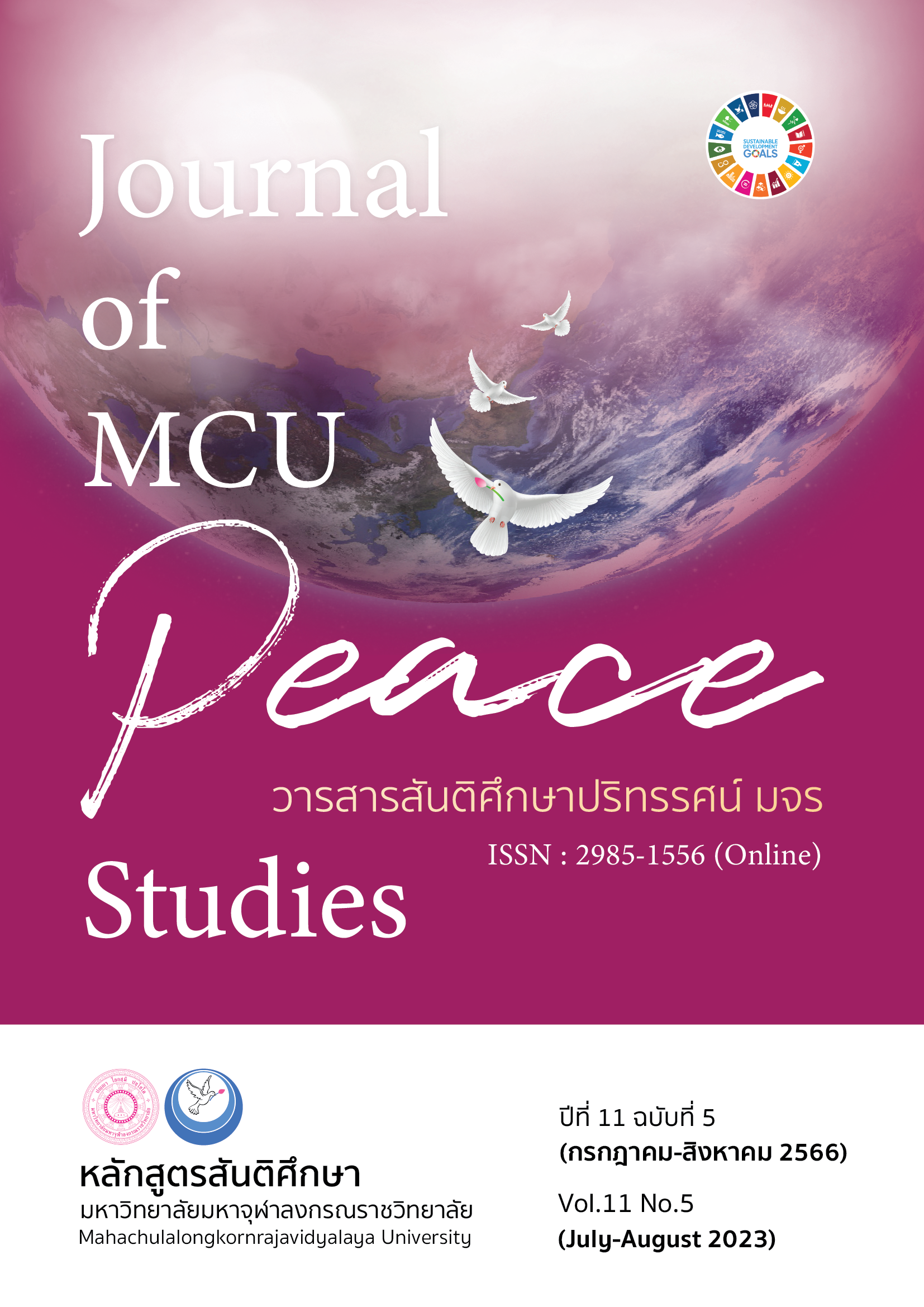โมเดลการส่งเสริมเกษตรอัจฉริยะในการผลิตพืชผักของเกษตรกรรุ่นใหม่ ในภาคตะวันออกของประเทศไทย
Main Article Content
บทคัดย่อ
บทความวิจัยนี้มีวัตถุประสงค์เพื่อศึกษา 1) สภาพพื้นฐานการทางเกษตรและการใช้เทคโนโลยีเกษตรอัจฉริยะในการผลิตพืชผัก 2) สภาพการส่งเสริมเกษตรอัจฉริยะในการผลิตพืชผักวิเคราะห์และสังเคราะห์ โมเดลการส่งเสริมเกษตรอัจฉริยะในการผลิตพืชผัก 3) ประเมินโมเดลการส่งเสริมเกษตรอัจฉริยะในการผลิตพืชผัก เป็นการวิจัยแบบผสมระหว่างการวิจัยเชิงปริมาณและคุณภาพ ประชากรคือ เกษตรกรรุ่นใหม่ในภาคตะวันออก 352 คน และผู้ที่มีส่วนเกี่ยวข้องจากหน่วยงานต่างๆ เก็บข้อมูลจากแบบสอบถามจากกลุ่มตัวอย่าง 188 คน และสัมภาษณ์เชิงลึกเกษตรกรรุ่นใหม่ที่มีการใช้เทคโนโลยีเกษตรอัจฉริยะมากที่สุดหกลำดับแรกและผู้ที่มีส่วนเกี่ยวข้องกับการส่งเสริมการทำเกษตรอัจฉริยะ 5 คน วิเคราะห์ข้อมูลโดยสถิติพรรณนา การวิเคราะห์ถดถอยเชิงพหุและการวิเคราะห์เนื้อหา
ผลการวิจัยพบว่า 1) เกษตรกรรุ่นใหม่ส่วนใหญ่ได้รับความรู้เทคโนโลยีเกษตรอัจฉริยะจากภาครัฐ มีการผลิต/ผลิตกัณฑ์พืชผักเป็นผักสด ร้อยละ 56.9 มีการใช้เทคโนโลยีเกษตรอัจฉริยะในระดับน้อยที่สุด 2) เกษตรกรรุ่นใหม่มีระดับความรู้ที่ได้รับจากการส่งเสริมทั้งด้านเนื้อหาเทคโนโลยีเกษตรอัจฉริยะ และด้านวิธีการส่งเสริมแบบต่างๆ อยู่ในระดับน้อยและมีความต้องการการส่งเสริมอยู่ในระดับมาก โดยเห็นว่า เทคโนโลยีเกษตรอัจฉริยะมีประโยชน์ และ โมเดลการส่งเสริมเกษตรอัจฉริยะในการผลิตพืชผัก ประกอบด้วย แหล่งความรู้จากภาครัฐ ภาคเอกชน และสถาบันการศึกษา ประเด็นการส่งเสริมคือ เทคโนโลยีเกษตรอัจฉริยะตั้งแต่ต้นน้ำ กลางน้ำ ปลายน้ำ และวิธีการส่งเสริมในรูปแบบต่างๆ ทั้งแบบบุคคล แบบกลุ่ม แบบมวลชน และเทคโนโลยีสารสนเทศ และกลุ่มเป้าหมายคือเกษตรกรรุ่นใหม่ 3) ผลการประเมินโมเดลการส่งเสริมเกษตรอัจฉริยะในการผลิตพืชผัก พบว่า มีความเหมาะสม เป็นไปได้ และเป็นประโยชน์ต่อการนำไปใช้ในการส่งเสริมเกษตรอัจฉริยะในการผลิตพืชผักในระดับมากที่สุด โดยโมเดลการส่งเสริมการเกษตรอัจฉริยะในการผลิตพืชผักของเกษตรกรรุ่นใหม่จะขับเคลื่อนได้ต้องประกอบด้วยปัจจัยต่างๆ ได้แก่ หน่วยงานที่ส่งเสริม การสนับสนุน นโยบาย เกษตรกร งบประมาณและชนิดพืชผัก/พืชผักที่มีมูลค่า
Article Details

อนุญาตภายใต้เงื่อนไข Creative Commons Attribution-NonCommercial-NoDerivatives 4.0 International License.
ทัศนะและความคิดเห็นที่ปรากฏในบทความในวารสาร ถือเป็นความรับผิดชอบของผู้เขียนบทความนั้น และไม่ถือเป็นทัศนะและความรับผิดชอบของกองบรรณาธิการ ยินยอมว่าบทความเป็นลิขสิทธิ์ของวารสาร
เอกสารอ้างอิง
Angkasit, P. (2018). Analytical Approach on Agricultural Extension. In Agricultural Extension for Development. Nonthaburi: The Office of the University Press Sukhothai Thammathirat Open University.
Berlo, K. (1960). The Process of Communication. New York: Hoit, Rinehart and Winston.
Chuenjit, K. (2016). The Study of Smart Farming Technology Guidelines: Case Study of Gran Monte Vineyard in Order to Support the Drive of Digital Development Plan for Economics and Society into Thailand 4.0. (Advanced Certificate Course in Public Economic Management for Executives). Bangkok. King Prajadhipoks Stitute.
Department of Agricultural Extension. (2018). Training Document for New Young Smart Farmer Development into Becoming Young Smart Farmer. (Photocopied Document). Bangkok: Agricultural Co-operative Printing Demonstrations of Thai Co., Ltd.
Department of Agricultural Extension. (2020). Operational Guidelines of the Department of Agricultural Extension in the Fiscal Year 2021. Planning Division. Bangkok: Agricultural Co-operative Printing Demonstrations of Thai Co., Ltd.
Kulawijit, B. (2017). Personal Media and the Agricultural Extension 4.0. Veridian E-Journal, Silpakorn University, 10(3), 2440-2454.
Ministry of Agriculture and Cooperatives. (2020). Smart Farmer Action Plan for 2022-2023. Retrieved January 11, 2013, from http://rdi.npu.ac.th/news/view?id=48&type=2
Office of Agricultural Economics. (2019). OAE Suggests the Production Improvement at the Regional Level, Preparing the Pulling of Big Data to Develop the Database of Key Agricultural Products. Retrieved August 5, 2021, from http://www.oae.go.th/view/1/
Office of Agricultural Economics. (2019). The Utilization of Land for Agricultural. Retrieved September 16, 2022, from https://www.oae.go.th/assets/portals/1/files/socio/Land Utilization2562.pdf
Office of National Economic and Social Development Council. (2018). National Strategies 2018-2037 (Government Gazette Edition). Retrieved November 20, 2021, from http://planning.dld.go.th/th/index.php/th/plan-menu/746-2561-2580
Panya, S. (2017). Promoting the Production of Safe Cabbage from Pesticides for Farmers in Tak Province (Toxic-free Cabbage Production Extension in Tak Province). (Master’s Thesis). Sukhothai Thammathirat Open University. Nonthaburi.
Puapongsakorn, N., Puntagua, K., & Wiwatwicha, N. (2020). Farming 4.0 Policy. Organized By Research Plan on Thai Citizen 4.0, Chiang Mai University and Public Policy Studies Institute Foundation under the Targeted Strategy of Integrative Planning. (Research Report). Thailand Development Research Institute of CMU. Ayutthaya.


